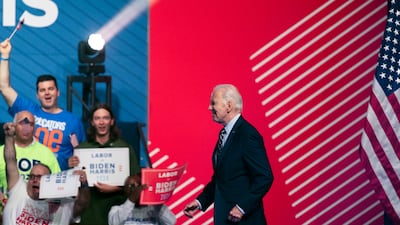A third of young Arabs believe the US wields the most influence in the region, with a majority wanting this to change.
The US was viewed as the country holding the most sway in the Arab world (33 per cent), ahead of the UAE (11 per cent), Saudi Arabia and Israel (both 10 per cent) and Russia (8 per cent), by respondents to the Arab Youth Survey 2023.
Sixty-one per cent of those polled said they “strongly or somewhat support” US disengagement from Middle Eastern affairs.
However, 66 per cent also said they expected the US to be a stronger ally than Russia over the next five years, while 62 per cent said the US would be a stronger ally than China.
The survey was conducted before recent comments from a former US senior official who told The National his opinion on his country's involvement in the region.
"There's no viable alternative for Middle East countries to an alliance with the United States," said Joel Rayburn, a retired army general and former adviser to General Petraeus in Iraq and Afghanistan.
"The great bulk of the blame lies at the feet of the US," he said, as countries in the Gulf were seeking alternatives to the US for support in resolving the region's conflicts.
The role of the US in the Middle East was often misunderstood, said another expert.
"The US is often blamed for anything that goes wrong in the region and also for not acting to prevent unpopular or mysterious developments," said Hussein Ibish, senior resident scholar at the Arab Gulf States Institute and a columnist for The National.
"The US role in the Middle East is badly misunderstood. The US is depicted as either an unreliable and feckless partner or an imperial and predatory power, depending on the spin from the outlet [which was reporting at the time].
"US support for Israel and a disinclination to pressure it on Palestinian rights dominates the image of the US in a highly negative manner among young Arabs."
However, the negative view of the US among young Arabs is not completely its own fault, as Middle Eastern countries could do more to explain its role, added Mr Ibish.
"Washington’s regional partners should do much better in explaining why and how the US role in the region is a huge benefit to most Arab countries," he said.
"All the GCC states have a partnership with the US at the core of their national security policies and security strategies.
"This is the reality but isn’t reflected in most of the Arab media, with rare exceptions. That gap between reality and perception is very damaging."
Young Arabs view Turkey as the region's biggest ally among non-Arab nations, followed closely by China, the UK, Germany and France.
Russia, a top three ally in last year’s survey, has fallen to ninth place on the list.
The Arab Youth Survey took place in March this year and polled the views of 3,600 people aged between 18 and 24 through a series of face-to-face interviews across 18 countries the Middle East and North Africa.
Israel was named as the country that most young Arabs (86 per cent) see as an adversary, followed by Iran (57 per cent) and Russia (32 per cent).
“All the respondents in this year’s study belong to Generation Z and the oldest were just into their teens when the epochal events of 2008 culminated in the Arab Spring,” said Sunil John, founder of Asda'a BCW, the PR agency that conducts the annual survey.
“Like the generation before them who lived through the global financial crisis, they are coming to terms with a new reality defined, on the one hand, by simmering conflicts and the involvement of new world powers in regional affairs, and on the other by regional governments seeking new alliances and a platform of their own on the world stage.”
Among Arab nations, Qatar is most widely regarded as an ally (92 per cent), followed by Kuwait (91 per cent), Egypt (89 per cent), the UAE (88 per cent) and Saudi Arabia (86 per cent).
As for the invasion of Ukraine, the highest proportion of respondents – 28 per cent – said the conflict was most likely to be resolved by diplomatic means.
However, a quarter of those polled said they expected the war to continue for a long time with no resolution.


